#but obviously feel free to disagree
Text
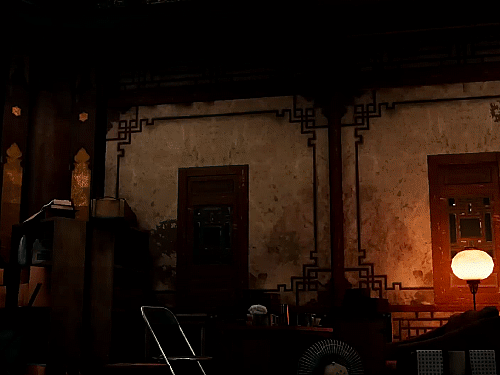




"Good job, Aerith!" "It was nothing compared to you!" // "I'm so glad you're all okay!" "Right back atcha."
#ffvii remake#ffvii rebirth#aerith gainsborough#tifa lockhart#aerti#aerith x tifa#ffvii rebirth spoilers?#i love them so much#and i'm sure someone's already made this gifset but better... but why not?#i quoted their first and last high five dialogue#aerti high fives are adorable and romantic too i think#but obviously feel free to disagree#ffviiedit#ffviiredit#tifalockhartedit#aerithgainsboroughedit#aertiedit#pls not aerith's little hop/jump and tifa leaning in... it's too cute#twitter could never make me hate either one of these ladies#i might be missing a high five or two so if you can let me knoe which ones i'm missing that'd be great!
964 notes
·
View notes
Text
Very interesting to me that a certain subset of the BES fandom's favourite iterations of Mizu and Akemi are seemingly rooted in the facades they have projected towards the world, and are not accurate representations of their true selves.
And I see this is especially the case with Mizu, where fanon likes to paint her as this dominant, hyper-masculine, smirking Cool GuyTM who's going to give you her strap. And this idea of Mizu is often based on the image of her wearing her glasses, and optionally, with her cloak and big, wide-brimmed kasa.
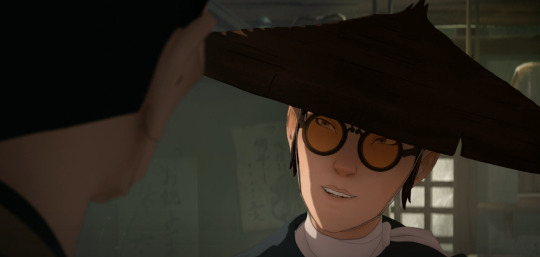

And what's interesting about this, to me, is that fanon is seemingly falling for her deliberate disguise. Because the glasses (with the optional combination of cloak and hat) represent Mizu's suppression of her true self. She is playing a role.

Take this scene of Mizu in the brothel in Episode 4 for example. Here, not only is Mizu wearing her glasses to symbolise the mask she is wearing, but she is purposely acting like some suave and cocky gentleman, intimidating, calm, in control. Her voice is even deeper than usual, like what we hear in her first scene while facing off with Hachiman the Flesh-Trader in Episode 1.
This act that Mizu puts on is an embodiment of masculine showboating, which is highly effective against weak and insecure men like Hachi, but also against women like those who tried to seduce her at the Shindo House.
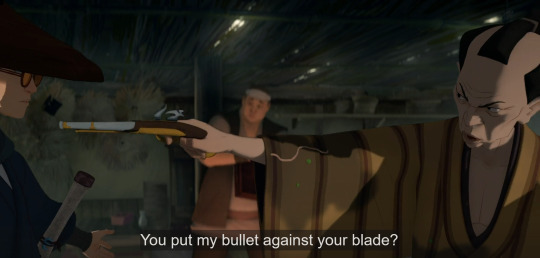

And that brings me to how Mizu's mask is actually a direct parallel to Akemi's mask in this very same scene.
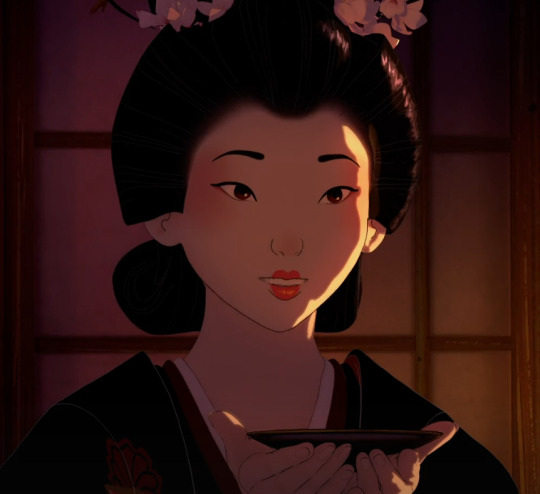
Here, Akemi is also putting up an act, playing up her naivety and demure girlishness, using her high-pitched lilted voice, complimenting Mizu and trying to make small talk, all so she can seduce and lure Mizu in to drink the drugged cup of sake.
So what I find so interesting and funny about this scene, characters within it, and the subsequent fandom interpretations of both, is that everyone seems to literally be falling for the mask that Mizu and Akemi are putting up to conceal their identities, guard themselves from the world, and get what they want.
It's also a little frustrating because the fanon seems to twist what actually makes Mizu and Akemi's dynamic so interesting by flattening it completely. Because both here and throughout the story, Mizu and Akemi's entire relationship and treatment of each other is solely built off of masks, assumptions, and misconceptions.
Akemi believes Mizu is a selfish, cocky male samurai who destroyed her ex-fiance's career and life, and who abandoned her to let her get dragged away by her father's guards and forcibly married off to a man she didn't know. on the other hand, Mizu believes Akemi is bratty, naive princess who constantly needs saving and who can't make her own decisions.
These misconceptions are even evident in the framing of their first impressions of each other, both of which unfold in these slow-motion POV shots.
Mizu's first impression of Akemi is that of a beautiful, untouchable princess in a cage. Swirling string music in the background.
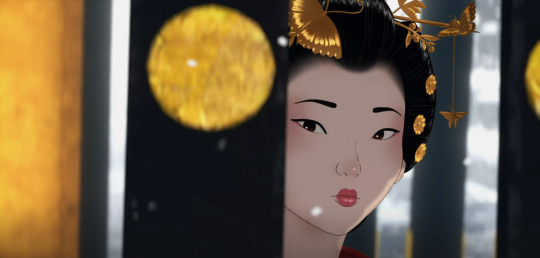
Akemi's first impression of Mizu is of a mysterious, stoic "demon" samurai who stole her fiance's scarf. Tense music and the sound of ocean waves in the background.

And then, going back to that scene of them together in Episode 4, both Mizu and Akemi continue to fool each other and hold these assumptions of each other, and they both feed into it, as both are purposely acting within the suppressive roles society binds them to in order to achieve their goals within the means they are allowed (Akemi playing the part of a subservient woman; Mizu playing the part of a dominant man).
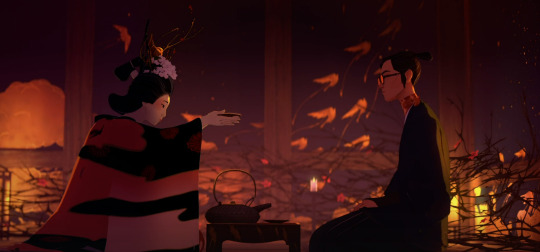
But then, for once in both their lives, neither of their usual tactics work.
Akemi is trying to use flattery and seduction on Mizu, but Mizu sees right through it, knowing that Akemi is just trying to manipulate and harm her. Rather than give in to Akemi's tactics, Mizu plays with Akemi's emotions by alluding to Taigen's death, before pinning her down, and then when she starts crying, Mizu just rolls her eyes and tells her to shut up.
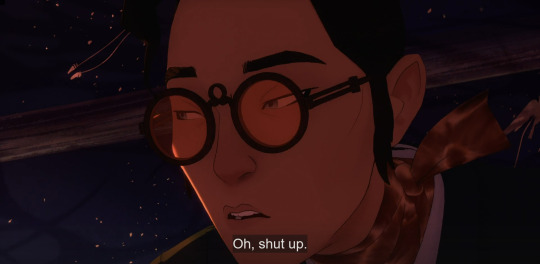
On the opposite end, when Mizu tries to use brute force and intimidation, Akemi also sees right through it, not falling for it, and instead says this:
"Under your mask, you're not the killer you pretend to be."
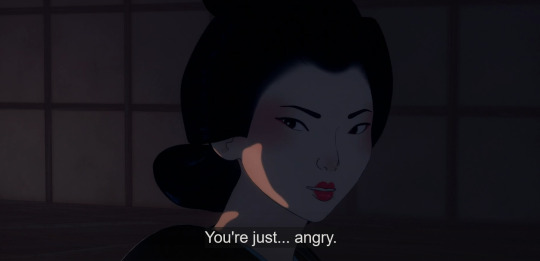
Nonetheless, despite the fact that they see a little bit through each other's masks, they both still hold their presumptions of each other until the very end of the season, with Akemi seeing Mizu as an obnoxious samurai swooping in to save the day, and Mizu seeing Akemi as a damsel in distress.
And what I find a bit irksome is that the fandom also resorts to flattening them to these tropes as well.
Because Mizu is not some cool, smooth-talking samurai with a big dick sword as Akemi (and the fandom) might believe. All of that is the facade she puts up and nothing more. In reality, Mizu is an angry, confused and lonely child, and a masterful artist, who is struggling against her own self-hatred. Master Eiji, her father figure who knows her best, knows this.
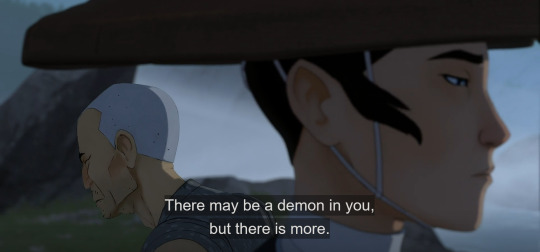
And Akemi, on the other hand, is not some girly, sweet, vain and spoiled princess as Mizu might believe. Instead she has never cared for frivolous things like fashion, love or looks, instead favouring poetry and strategy games instead, and has always only cared about her own independence. Seki, her father figure who knows her best, knows this.
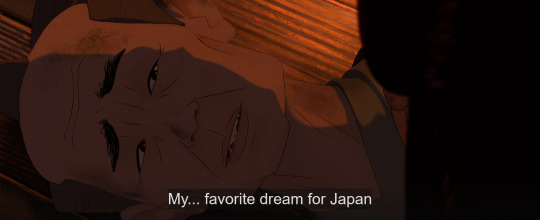

But neither is she some authoritative dominatrix, though this is part of her new persona that she is trying to project to get what she wants. Because while Akemi is willful, outspoken, intelligent and authoritative, she can still be naive! She is still often unsure and needs to have her hand held through things, as she is still learning and growing into her full potential. Her new parental/guardian figure, Madame Kaji, knows this as well.
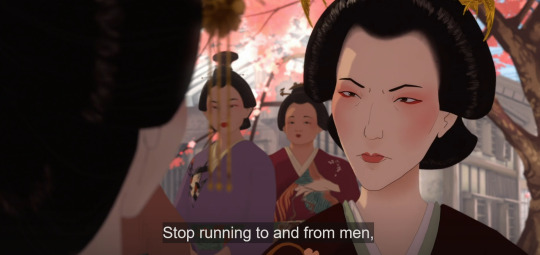
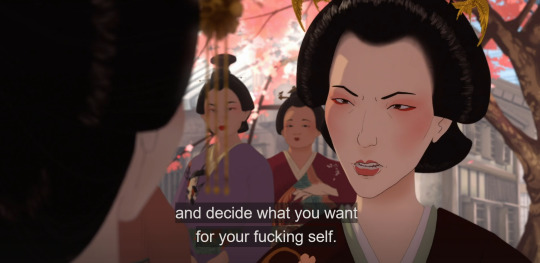
So with all that being said, now that we know that Mizu and Akemi are essentially wearing masks and putting up fronts throughout the show, what would a representation of Mizu's and Akemi's true selves actually look like? Easy. It's in their hair.
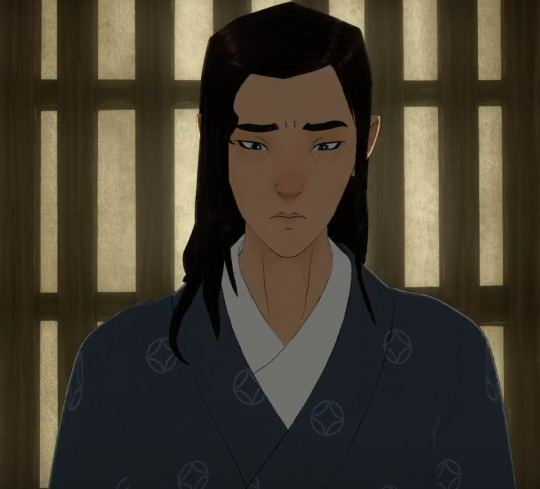

This shot on the left is the only time we see Mizu with her hair completely down. In this scene, she's being berated by Mama, and her guard is completely down, she has no weapon, and is no longer wearing any mask, as this is after she showed Mikio "all of herself" and tried to take off the mask of a subservient housewife. Thus, here, she is sad, vulnerable, and feeling small (emphasised further by the framing of the scene). This is a perfect encapsulation of what Mizu is on the inside, underneath all the layers of revenge-obsession and the walls she's put around herself.
In contrast, the only time we Akemi with her hair fully down, she is completely alone in the bath, and this scene takes place after being scorned by her father and left weeping at his feet. But despite all that, Akemi is headstrong, determined, taking the reigns of her life as she makes the choice to run away, but even that choice is reflective of her youthful naivety. She even gets scolded by Seki shortly after this in the next scene, because though she wants to be independent, she still hasn't completely learned to be. Not yet. Regardless, her decisiveness and moment of self-empowerment is emphasised by the framing of the scene, where her face takes up the majority of the shot, and she stares seriously into the middle distance.
To conclude, I wish popular fanon would stop mischaracterising these two, and flattening them into tropes and stereotypes (ie. masculine badass swordsman Mizu and feminine alluring queen but also girly swooning damsel Akemi), all of which just seems... reductive. It also irks me when Akemi is merely upheld as a love interest and romantic device for Mizu and nothing more, when she is literally Mizu's narrative foil (takes far more narrative precedence over romantic interest) and the deuteragonist of this show. She is her own person. That is literally the theme of her entire character and arc.
#blue eye samurai#mizu blue eye samurai#akemi blue eye samurai#blue eye samurai meta#just in case... im gonna tag this as#mizukemicritical#akemizucritical#though this post isnt actually criticising the ship itself but rather fanon's portrayal of the ship and the characters#for that reason lemme also tag this as#wank.mp3#feel free to disagree of course but please be civil#and if you need to rant about how wrong i am without any convincing evidence kindly feel free to make your own post. peace and love <3#fandom.rtf#meta dissertations.pdf#shut up haydar#edit: for full disclosure. i do rather dislike this ship. but obviously it's fine for anyone to enjoy it. please do! have your fun!#it's just that as usual! popular fanon and fandom around a ship is what has completely deterred me from any sense of enjoyment of it#it's a shame too because i was very open and even eager for some mizu/akemi romance in the future#but out-of-character fanon + the rudeness of certain fans has definitely soured it for me#but that doesn't mean people can't enjoy it obviously! ship and let ship!!!#plus it has its appeal which i DO STILL see and enjoy!!!!#i would even go as far as to call them soulmates because their narratives and characters are LITERALLY intertwined!!!#but. yeah. my gradual distaste for this ship is indeed very unfortunate.
671 notes
·
View notes
Text
CLASSES - a comprehensive guide
The first thing that needs to be said is that there is no such thing as a "bad" class. All of them have the potential to be a great detriment OR great boon to the rest of the team, depending on how far along the journey of self-actualization a party member is. Some may have steeper challenges, but this corresponds with greater rewards.
The second thing that needs to be said is that all players are part of a team, and all personal journeys and playstyles are interlinked. No class is truly "solo." Even the smallest viable session is still two people, and even the most suitable classes for solo play are stronger when they're in a party.
The last thing that needs to be said is that the game wants you to succeed. The game, inherently, wants every player to reach godhood, wants every player to self-actualize, wants every player to win. It respects free will and free choice, so it will allow for failures (and, indeed, doomed timelines are vital to the alpha one existing), but Skaia is ultimately optimistic, and tries at every turn to ensure that a golden ending is possible.
Because, after all, SBURB/SGRUB - and Homestuck itself - are about children growing up, maturing, and learning compassion for each other. About fixing their flaws and rejecting the negative aspects of the society they came from. It's about how it is our duty, our responsibility, to become kind, mature people who care about one another, because we will one day be responsible for creating a new society.
And so, without further ado:
ACTIVE (-) Classes and PASSIVE (+) Classes are described with the dichotomy of "powers working for the self" vs. "powers working for others," but I believe this to be an oversimplification of what the active and passive split is. Both active AND passive classes benefit from being in a party; however, an active class will gain fewer party benefits in exchange for being more suited for solo play, while a passive class will be less suited for solo play, but confer much greater benefits to party play.
This is reflected in their personal quests: while active classes and passive classes will both require intervention, empathy, and guidance from their teammates, the struggle of an active class is usually one of grappling with internal flaws, and the struggle of a passive class is one of grappling with interpersonal or societal relations. In other words, the personal quest of an active player will usually involve getting therapized, while the personal quest of a passive player will usually involve addressing a systemic societal issue. Often, both will be required, but whether a class is active or passive will indicate an area of focus.
KNIGHT - / MAID +
PARTY MANAGEMENT
one who wields [aspect] or leads with [aspect] / one who distributes [aspect] or manages with [aspect]
KNIGHTS (-) are a very flexible and versatile class; "wielding" their aspect does not necessarily mean they are skilled at DPS. It actually indicates the way a knight interacts with their aspect, a very straightforward relationship of tradesperson and tool, or soldier and weapon. Similarly, while a knight does not always take up the "leader" position in the party, they will be the "spearhead," a point behind which the other players rally, a beating heart keeping the party together.
This straightforward relationship between a knight and their aspect leads to knights finding little difficulty mastering their aspect once they've begun. Many knights are, in fact, instinctively drawn toward utilizing their aspect, in the same way that they are naturally drawn toward roles of importance or heroism.
Knights often struggle with their perceived place in society, as well as with their innate sense of self and self-worth, seeing themselves as outcasts, resenting the responsibility placed on their shoulders, and fearing vulnerability. Unaddressed, these issues will lead to knights who actively become a detriment to party success. For example, they can dismiss valid concerns, shirk their duties, and in the worst case scenario, actively lead the party down the wrong path, invoking their natural ability to lead for ill.
Therefore, a knight's journey is one of accepting themselves and accepting their duty to better the world. It is about coming to terms with their own insecurities and learning to rely on others. It is about learning to take responsibility, and accepting the banner of a just and glorious cause.
A fully realized knight will be the center of every charge, the guiding star behind which the other players rally. They can provide clarity and guidance to those still on their journeys, and peace and comfort to those who are struggling or in pain. Where the knight goes, the party will follow, as a unified and united front.
MAIDS (+), meanwhile, tend to be on the backlines. If the knight is the forward march, then the maid is the supply line, an incredibly vital role whose absence is disastrous, even if its presence is nearly invisible. Maids have a nearly infinite well of their aspect to distribute, and are uniquely talented at managerial duties - keeping players on task, patching up the holes in a plan, sourcing and supplying resources, so on and so forth.
This is not to say that maids are relegated to support roles - a maid is usually capable of holding their own in combat just fine, especially if they've been endowed with a more combat-suited aspect. Both knights and maids are extremely versatile. That being said, maids truly shine when they're able to take on these backline roles, and many maids are more noticeable by the devastating effects of their absence rather than the invisible touch of their presence.
However, they are the class that most often starts in subservient conditions - low status, strict duties enforced upon them, so on - and their personal journey is a constant struggle against the control of others. Maids whose parties fail to grapple with and undo these shackling forces will find their maids succumbing to the influence or control of malicious entities; in the worst-case scenario, a maid can become an actively hostile enemy or saboteur, invisibly pulling the party's strings and setting them up for failure.
Therefore, a maid's journey is about rejecting societal oppression and throwing off the chains that bind them. A successful maid rises to become the head of the household - nothing occurs within the game that does not first pass the maid's inspection, and their touch ensures that there is a place for everything, and everything is in its place.
A free maid, who belongs to themselves, incomparably increases a party's efficiency. Every communication line is clear, every distribution route is clean, every mystery is solvable, and every plan is airtight. A maid guarantees that nothing can ever go too wrong.
PAGE - / HEIR +
TEAM BONDING
one who must earn [aspect] or inherits the mantle of [aspect] / one who is beloved by [aspect] or awakens to [aspect]
PAGES (-) start the game with the fewest benefits from their aspects, but the greatest potential for growth. Theirs is a constant battle with the self; they are often cowardly and naive. They possess sensitive souls, and while it is incredibly easy to hurt a page, it's much more difficult to build them up. Because of the difficulty of raising this class, it's practically defined by its journey - a constant struggle against the self - rather than its destination, and the powers the class confers.
Pages, like heirs, are classes of inheritance. A page is promoted by trials and tribulations and comes to inherit a greater power than they begin with; in the same way, the class will one day come to embody its aspect, although the road will always be turbulent and long. Moreover, it is a journey without end; pages, being as sensitive as they are, are the most prone to backwards progress, even after reaching their peak.
They prone to staying weak throughout the entire game, never self-actualizing past being the party joke. They attract the obsession and ridicule of stronger-willed players, and their mistreatment can become extremely divisive. A page can easily become a party's albatross, the epicenter of massive interpersonal conflicts, which can tank an entire session.
Therefore, a page's journey is one of the most difficult of all - that of teaching others how to care about other people. Pages rely on great patience, kindness, and understanding. Their sensitive souls must be carefully nurtured and propagated with love and attention. In the same way that a page can tear a team apart, they can bring a team together, all in the name of compassion and empathy. A fully-realized page is the symbol of a party that has linked hands with one another.
Self-actualized pages, as a result of the difficulty inherent to the class, are incredibly powerful and versatile when fully realized. Inheriting the mantle of their aspect, they become pure embodiments of their aspect, capable of achieving impossible feats of raw, unfiltered power, and inspiring all those who gaze upon them.
HEIRS (+) begin the game very strong, but have a difficult time becoming stronger. This is because their usage of their aspect is very instinctual to them, even at times being entirely beyond their control, hence, "beloved by" in the class description. However, because of how naturally their aspect comes to them, it makes taking further command of their powers difficult.
An heir "awakens to" their aspect because their natural, intuitive control often renders them too comfortable to grasp the greater implications of their class. As an inheritance class, heirs can come to embody their aspect, transforming entirely into it. Their challenge lies in breaking out of their comfortable shell and learning how to utilize their powers in more active, intentional ways.
This is reflected in their personal quests. They are often set to inherit great privilege or wealth prior to entering the game, and are thus naive to the realities of the suffering and pain of others. Without a supportive party willing to challenge their views, heirs can perpetuate that pain by submitting to their place in the world, becoming a divisive force within the party, or, in the worst case, losing themselves to their inheritance, and submitting so wholly to their aspect that they become lost to the rest of the team.
Thus, an heir's journey is to question the stratification of the society they belong to, so that they can recognize and address its flaws. They must learn to interrogate their inheritance, separate it from themselves, and reconcile with it. Theirs is an arc of examination and understanding, descending from their position of privilege and peace to learn about the suffering of others, and deciding that they wish to do something about it.
With full command over their aspect, and a clear vision for how it ought to be distributed, the party gains a new and powerful ally - the aspect itself, which will come to embrace the entire party as family. A fully-realized heir connects the privileged and underprivileged, spreading their inheritance to all.
MAGE - / SEER +
GUIDANCE
one who invokes [aspect] or is drawn to [aspect] / one who comprehends [aspect] or is guided by [aspect]
MAGES (-) are a class of prophets, although saying they "see the future" is misleading. Rather, mages "invoke" the future, collapsing causality to align to their desires. Most mages remain unaware that they are doing so until well into their journey. While all players weigh on the scale of causality, affecting both past and future events, and which sequence of events is the "alpha" sequence, mages have the most direct effect.
Because of this ability to invoke future events, mages possess powerful buffing/debuffing abilities. Furthermore, as one of the two knowledge classes, a mage usually has a very deep understanding of their aspect, and an intuitive knowledge of how the flow of time and causality function. They are "drawn to" their aspects in this way, instinctively searching out points where their influence can affect the flow of events.
However, with great power comes great cost; the mage class is usually assigned to those who are stricken by tragedies and prone to negativity and self-loathing. Mages often begin the game as a detriment to the party, "prophesying" future events that leave the party - including themselves - at a disadvantage. In the worst case scenario, a mage can invoke certain doom for their party or themselves.
Therefore, it is vital that a mage address their tragedies and be given a chance to heal and grow. The ones most struck by tragedy, theirs is a journey of reclaiming lost joy and rediscovering lost hope. However, the transformation is powerful once completed - as the one who suffers tragedy and loss most intimately, a mage can also come to be one of the most empathetic and compassionate members of the team.
If a mage is uplifted, and capable of believing in a kinder and gentler world, then their ability to invoke the future - and the aspects of their aspect that they are drawn to - become kinder, as well. Pain and suffering still have their place, but the ending will be a happy one. With a fully empowered mage, the future will always be better than what came before.
SEERS (+) see multiple branching paths. A mage determines where a road will be built, but a seer tells you where a road CAN be built. They are also often gifted with knowledge of the game and its mechanics, and are especially uniquely gifted with understanding of their own abilities. In this way, they "comprehend" their aspect.
Seers themselves are not particularly gifted in combat through their classpect alone; however, in exchange, they often play a vital role in steering the party. They are the game's built-in guides, with an intuitive knowledge of the game's victory conditions, as well as an instinctive desire to lead others along their paths. Seers are, therefore, one of the most important classes in the game, when one is present.
However, the ability to see is a burden as well as a gift. Seers find themselves paralyzed by choice, and often doubt their own abilities to choose "correctly." They are prone to becoming mired in what-ifs, and struggle with political or ethical debates with no clear answers. In the worst-case scenario, a seer may feel so cursed by their sight that they self-destruct, and deliberately choose poor or incomprehensible answers, in an attempt to free themselves of their sight.
Thus, a seer's quest is, ironically, to see the world beyond the purview of their aspect. They must come to have a more comprehensive understanding of the world they live in, and what purpose they are trying to achieve, so that they can feel confident in the choices they make. A seer is often blind - their journey, therefore, is that of regaining their vision, by connecting with the world outside their inner sight.
A seer with a clear vision for the future will always know exactly which path to choose. A party with such a seer in it will never be stuck and never be lost. If there exists a path to self-actualization, the seer will know it. And if there exists a path to a breathless and perfect victory, a fully-realized seer will light the way.
THIEF - / ROGUE +
UTILITY
one who steals [aspect] from others or steals with [aspect] / one who steals [aspect] for others or steals from [aspect]
THIEVES (-) are a very difficult class to play. They start out with almost no passive abilities regarding their aspect, and their ability to actively use their aspect is contingent on their ability to first "steal" it from someone else. Thus, they are always playing a game of resource management, and there is always a chance for them to be left helpless after a heist gone wrong.
However, their gimmicky nature allows them to overtake other classes even in that class's specialty, if they can set up the exact right circumstances and manage their resources well. This makes them incredibly versatile, especially when a thief is working together with a party, and thus able to count their party among their potential resources. It takes great cunning to play the thief class well.
However, this also makes the thief a potentially dangerous element to the rest of the party. Thieves are often egotistical and self-serving, willing to see enemies and allies alike as resources and tools. Unaddressed, their reckless, selfish natures will earn their teammates' distrust and enmity. In the worst case scenario, a thief running rampant can severely harm the party, or earn so much ire that the party turns against them.
Thus, their journey is that of realizing that their selfishness and ego are flaws - the classic parable of "money doesn't bring happiness." Beneath their uncaring surface lurks genuine emotional distress; a thief must come to realize that their greed and selfishness is an active detriment not only to the people around them, but their own selves. Only then can they heal from their injured souls.
A thief that has undertaken this journey is one who has realized that they are stronger when they are working with others. Their versatility, creativity, and cunning are incredible assets once harnessed toward the will of the party. No situation will ever be inescapable, no safe uncrackable, and no problem unsolvable - not if the thief has anything to say about it.
ROGUES (+) are similarly difficult to play. Unlike the thieves, rogues do see passive benefits from their aspects. However, their active abilities are much less straightforward, and rogues often struggle with understanding them. A rogue's role is to redistribute wealth - thus, "stealing for the sake of others."
A rogue, being able to steal directly from their aspect, truly shines when given enough time to prepare. If a thief must fly by the seat of their pants, then a rogue is a heist planner - they have an infinite box of tools to pull from, if only they know what tools they'll need for the job. This makes them incomparably versatile, even if not necessarily in the heat of combat.
Rogues take on the mantle of challenging the status quo. They usually begin the game already in opposition to their society, seeking out better alternatives and considering unorthodox options. However, not every party is ready for a rogue's radical ideology, and not every rogue has considered the full consequences of their belief in change; in the worst case scenario, the rogue can become outcasted and disregarded, or cause an upheaval that proves disastrous, rioting for the sake of rioting.
It often requires the help of others for a rogue to understand how to use their powers. In the same way, it requires the party's honest communication and exchange of ideas to help a rogue grasp exactly what form their rebellion ought to take. A rogue knows instinctively that something must change; their journey is learning how they ought to go about it.
Once they do, a rogue - given enough time to prepare and plan - is the ultimate utility player, having the right tool for every possible situation. Their abilities are only magnified in a party setting, as their teammates become variables that unlock new possibilities. A party with a fully-prepped rogue always has a perfect plan, a way to solve any problem that they might face.
WITCH - / SYLPH +
AREA CONTROL
one who manipulates [aspect] or achieves dominion through [aspect] / one who nurtures [aspect] or creates a land of [aspect]
WITCHES (-) carry with them the winds of change. A witch manipulates, changing properties of their aspect and their aspect's effect on others, creating a "territory" over which they rule. They see few passive benefits of their aspects, in exchange for their active abilities being so all-encompassing and overwhelming.
Once their territory has been established, witches make the rules. Their changes can be permanent, temporary, massive, and miniscule. However, a witch "achieves dominion" with their aspect - this means that they must first struggle to create this domain, and it's difficult for their abilities to manifest until they do, often leaving younger witches weak and vulnerable.
Witches have strong feelings for how things should and should not be, but not necessarily grounded ideas for how to implement them, often due to some "outsider" status in society. Unfocused witches become dangerous for the party, as they are easily manipulated; in the worst-case scenario, they can fall in with malicious forces, who can sway a witch's turbulent heart and utilize them as a force for negative change, rather than good.
Thus, a witch's journey is that of interrogating right and wrong. A witch must struggle with morality and ethics, and come to clarify their own beliefs; only then can they know what sort of domain they wish to establish, and what sort of rules they wish to enforce. Once they know their own hearts, they can shake off the insidious whispers of malicious external influence.
As if a reward for their struggles for autonomy and independence, the witch is the one whose will is most imposed on the world that comes after them. Just as an evil witch putrefies the world around them, a fully-realized witch who has decided to use their influence for good can create a near-utopia.
SYLPHS (+) call to mind the images of fey folk who sprout plants where they walk. That is how a sylph "creates a land" of their aspect - merely by existing, the world around them becomes suffused by it. A sylph's mere presence nurtures, grows, and heals their aspect; unlike witches, who manipulate what is already there, sylphs can create something from nothing.
The establishment of their domain comes naturally to them. Those caught within it are on the receiving end of their aspect, whether they want to be or not. In exchange for such powerful passive abilities, a sylph's active abilities are weaker, and usually unsuited for solo combat, generally being of healing, buffing, or debuffing nature.
A sylph is prone to selfishness - to luxuriating within their own land, their own aspect, their own mind. They often have difficulty connecting with others and understanding why their own personal world may not be to the liking of the world outside of themselves. Often, they are aloof. An unrealized sylph can cause great harm to the world around them, their domain choking out and smothering their party; in the worst case, they can mire their party within it, leaving their party unable to proceed.
Thus, it often requires the outside world to breach their safe haven in order for a sylph to grow. They must be made uncomfortable, and then made to accept that uncomfortable things are also important - maybe even more important than comfort, at times. Growth often requires pruning; a sylph's journey is to come to understand that good intentions may lead to harm, and, vice versa, that harm can often lead to true growth.
Sylphs can provide the greatest compassion and emotional comfort within a party, encouraging - if not enabling - their teammates' growth in their personal journeys. Once a sylph understands when it is appropriate to encourage, and when it is appropriate to pull back, there is no refuge safer for the party than the sylph's domain.
PRINCE - / BARD +
OBSTACLE REMOVAL
one who destroys [aspect] or destroys with [aspect] / one who allows the destruction of [aspect] or allows destruction through [aspect]
PRINCES (-) possess the ability to annihilate, a destructive class not limited to physical or tangible objects. Princes also enjoy auxiliary benefits as befits their royal titles - many princes start the game with great talents, great status and wealth, or both. They are also endowed with royal presence; their very existence provokes strong emotions from those around them, for good or for ill.
One of the more straightforward classes in the game, a prince's ability to destroy most commonly manifests as DPS. However, their abilities encompass a greater scope than mere damage - the prince's ability to annihilate figurative or metaphysical concepts makes them capable of directly removing any obstacles that stand in their way. As if hungry to consume their aspect, they are naturally drawn towards where it congregates.
However, with great power comes great responsibility: princes are often the most psychologically maligned within the party, and their destructive talents can very easily become self-destructive instead. Usually the result of societal pressure, trauma, and suffering, a prince is prone to embodying the lack of their aspect, rather than its presence. In the worst-case scenario, a prince spreads this misfortune to the rest of their party, destroying the presence of their aspect from their session altogether, often taking themselves along with it.
A prince must be shown compassion. Though they are often viscerally unpleasant to engage with, turning a blind eye to foolishness, loneliness, and suffering - which a prince embodies - is one of the worst things that a party can do. Though the effort at times seems undeserved, to heal a prince requires a staunch belief that there is good to be gained if we are kind to each other. This kindness will be returned; once you are counted among a prince's "people," they will do anything to keep harm from befalling you.
A prince, once shown this grace, is incomparably powerful. To destroy their aspect or with their aspect is the ability to destroy nearly anything, including concepts such as despair, death, and doom. As if proclaiming a royal decree, a fully-realized prince can banish misfortune and ill tidings altogether, leaving nothing standing in the party's way.
BARDS (+) are a wildcard of a class, often responsible for a party's improbable victory, abject defeat, or both. Their abilities are not very well-understood, even by the bard themselves, and they often utilize both passive and active abilities intuitively, unaware that they are doing so. The morale of the party is deeply tied to the bard's own, and it's unclear which side is cause and which is effect.
The ability to allow the destruction of their aspect, or invite it through their aspect, is actually something of a debuff rather than DPS - the bard's ability is to break unbreakable shields, tear down unclimbable walls, and nullify unstoppable forces. Rather than dealing damage themselves, they allow for damage to be dealt that would otherwise have no effect - in other words, by nature, they make the impossible possible. This is the true source of their ability to evoke "miraculous" situations.
Bards are inextricably tied to society - after all, their tales only hold as much value as their relevance to the audience. This means those with the bard class are invariably molded by the worst aspects of the society they come from. They serve as living embodiments of the most unpleasant aspects of society, and living reminders that leaving these elements to fester only means they will multiply in severity. If these beliefs are allowed to go unexamined, bards will always steer a party towards ruin.
Therefore, a party must engage with the bard earnestly, compassionately, and openly, and help them see the errors of the past. A bard must be led, with gentle guidance and genuine openness, to discard their harmful beliefs, and sing a new, more beautiful tune.
A bard that has been brought back into the fold is a worker of miracles. When every other possible option has been exhausted - the knight and maid in disarray, the page and heir unable to keep the party together, the mage and seer blinded, the thief and rogue out of action, the witch and sylph with their territory lost, the prince no longer able to function - this is where a bard will step in, transmuting abject defeat into a perfect and breathless victory.
#homestuck#classpect#classpects#just my own opinions obviously#feel free to disagree#this is also more meant to examine the actual text of homestuck or serve as a reference for fanworks#i dont actually vibe that much with classpecting actual real people#because unlike fictional characters we contain multitudes#still i cant STOP you if thats what you want to do hahahah
397 notes
·
View notes
Text
speaking of leverage because I’m deep in my rewatch and my feels
the fandom talks a lot about Parker’s autism and how supportive the crew is if her and her development etc and that’s great obviously, I love that for her! And for us!
I have been thinking a lot lately that because Parker’s autism is so visible - she’s weird, and she clearly thinks differently to others and has issues with relating to other people, she has hyperfixations (breaking into safes! Jumping off buildings/rappelling! And related, designing climbing gear, and so on - it makes Eliot’s autism near invisible.
Eliot has hyperfixations too, but unlike Parker who has a few big long term fixations, Eliot is the type to learn a lot about a niche topic in a short time and then moves on, but never forgets a previous fixation. This is part why he knows stuff nobody expects and can identify something because of a distinctive something, sure part of it is survival bc of his line of work, but enough of what he knows isn’t relevant to it that it stands out.
Add to that his choice of clothing when not dressed for a role is always comfortable and easy to move in (and even when dresses for a role, say in a suit, he usually wears the collar open almost as if he hates having a restricted collar…like that one time he argued with Hardison about who got to have the bigger size collar shirt on a job…
Eliot struggles with relationships too and while part of it is in no doubt due to trauma, consider how he joined the team - his awkward conversations with the rest of them (including that time he misread the situation and tried to friend-joke with Nate and Nate straight up put him in his place and you could see in Eliot’s face how much that actually bothered him) until he got so deeply attached to them that nobody could possibly pry him away?
Listen there’s so much more, I feel like Eliot’s been masking for so long he just flies under the radar especially since Parker is so much more obvious, and he probably doesn’t even know he’s autistic. But I think it’s worth talking about !
#feel free to disagree obviously#and add on to this post#I am too tired to continue I’m going to bed#leverage#eliot spencer
287 notes
·
View notes
Text
Okay so some of these head cannons will make sense and others you may need to put your tinfoil hats on. Don't worry I have enough tinfoil for all of us to share

#Obviously I have been thinking about this a lot#also forgive me if there are any typos because I am very tired and forgot to sleep last night#feel free to let me know what you think and if you agree or disagree with anything#good omens#aziraphale#ineffable husbands#crowley#ineffable idiots#good omens makes me emotional#good omens 3#go season 3 predictions#GO spoilers#good omens crack#good omens bingo
28 notes
·
View notes
Text
I kinda dont like peoples reactions to GTA6
AND THIS WILL BE MY ESSAY ON WHY ITS STINKY
1. That was just a trailer with absolutely ZERO in game gameplay. That was clearly every single rockstar graphics card in their office combined together to make an extremely cinematic scene. Your PS5 will NOT look like that. It just wont. Prepare to be disappointed.
2. Why are you all being weird about a girl main character? Im not talking about the normal incel woke cryers, but why is everyone like ‘a girl ( ͡° ͜ʖ ͡°) wow look its a female in a game wow so crazy shes instantly in my spank bank so hot wow’ ???? So video game culture of you, i hate it.
3.bitch i would put MONEY real life MONEY down on that game coming out at its very earliest- holiday season 2025. And PC version wont be for another 2 years.
I just think we should all adjust our expectations and also stop being fucking weirdos about a girl main character
Lastly id like to close with my insane definitely-not-happening idea, when i saw the bonnie and clyde dynamic, i instantly wished for co-op. It wont be, but it would be so cool if it was.
#rant#obviously feel free to disagree with me#just my opinion#lets speculate wildly#gta 6#gta vi#grand theft auto
20 notes
·
View notes
Text
what i find so fascinating about criston cole and his position and emotional state in the past two episodes is the fact that... he has almost (not entirely of course but more than most men in this world would be) been pushed into a social position of powerlessness that is usually reserved for women. he ends up having sex with rhaenyra in a situation where the power dynamics are a bit weird and uncomfortable for him (reminiscent of how young women are expected to perform their 'marital duties' to husbands they rarely get to choose and who have pretty much absolute control over them), his celibacy vows that he betrays in that moment almost feel like an apt metaphor/stand in for a young ladies maidenhead. and then when he tries to reconcile these things with himself and with rhaenyra by asking her to run away with him, he finds that he matters very little on a personal level to her. he feels used and abandoned and betrayed. it's somewhat of comparable to the position of a young highborn lady who got seduced into sleeping with a man under the impression that he would marry her and therefore 'save' her from the social repercussions of her own sexual freedom and his manipulations, only to be left hanging and facing the wrath of society. it obviously doesn't fully compare, but it is probably as close to it as any man would come. and that's why i find his devastation and visceral violence (through attempted self annihilation + murder) so interesting. especially when compared to the way rhaenyra and alicent react to their own experiences with these things.
and it also makes a lot of sense why him and alicent would bond in this weird, bitter way against rhaenyra in that situation. she attempts to get out of her socially imposed position of powerlessness (without full success, of course) in a way that neither of them feel is possible to them, as a choice. rhaenyra's attempts at agency and her treatment of both of them in search for that agency feel like a betrayal to them. a personal betrayal, but also a betrayal of the social order they feel like they habe to hold onto because they can not imagine an escape from it. rhaenyra refuses to let go, or apologize for what little power and agency she carved out for herself, leaving criston in a powerless position he feels is unbearable and isolating and shutting out alicent, despite knowing about her misery and pain.
and i honestly can not wait for how fucked up that relationship between the two is going to get, emotionally lol.
#rhaenyra targaryen#alicent hightower#criston cole#house of the dragon#obviously criston is still a bit of a self important f*cker in all of this imo but i get where he is coming from#at least emotionally#the westerosi hate crimes as a maladjusted coping mechanism are unfortunate tho#not cool d*ckhead#does any of this make sense? lol#idk i am half asleep and brain storming#feel free to argue with me if you disagree
146 notes
·
View notes
Text
can’t believe they didn’t have Yoshiki connect his experience with being possessed to that one guy who broke into the school grounds and killed himself.
#I also doubt he’s going to connect it for the old man he also just watched die#Idk I just feel like we missed a window of opportunity#Because it’d seem insincere for him to only make the connection now right? Like it feels like a lot of time has passed even#if it’s only been 2 days. It’s going to be coming a whole volume later. The audiences sense of time is skewed#And like the diner scene is so tonally jarring? The slapstick faces and casual air to everything#And I guess it’s supposed to be scary but it literally made me laugh so hard seeing the ghost under the table#And the ghost going ‘YOOOOOO’ also sent me#“I won’t treat death lightly anymore”#“Huh? Someone died? When did that happen? Anyway I have to study for my math test”#I’m not saying I want Yoshiki to be crippled emotionally every time something bad happens#But just like acknowledging the tragedy of an innocent person being forced to do something like that and offering empathy?#Because Yoshiki could’ve suffered the exact same fate. He only didn’t because he aligned himself with ‘Hikaru’#the summer hikaru died#hikaru ga shinda natsu#hgsn#hgsn spoilers#idk you’re free to disagree with this. Emotional scenes are just what I like and ‘spooky scary ghosts’ aren’t#So obviously I’d prefer an emotional scene over yet another ghost trying to tickle Yoshiki#My hgsn shit
14 notes
·
View notes
Text
I love you guys but we can’t pretend that Ascended!Astarian/Spawn!Durge is anything but Durge handing their leash to another master.
#resist the urge durge obviously#text#bg3#bg3 spoilers#feel free to disagree but he won’t even let you break up with him so let’s reflect#astarion#spawn astarion and resist the urge durge are canon and my beloved sorry
15 notes
·
View notes
Text
throwing up bc the first thing i saw when i woke up is a post from some person REBLOGGING someone else's fic and ranting about how the characterization is terrible. i had a look at the person's blog and they had several posts about other characters, basically just ranting about how people who characterize them certain ways are awful and wrong and should stop posting their content or wtv. and obv the first and last interaction I'm going to have with this person is blocking them, so that they don't have the opportunity to reblog one of MY works and tell me that MY fanfiction is wrong. but how was this supported? how were there people in the notes agreeing with their sentiments?
there's a difference between extremely problematic content that isn't properly tagged, and characterization preferences. it's actually fine to reduce characters down to a few personality traits, it's actually fine to reject source material. please let people write what they want. and don't reblog it with unsolicited criticism 😭 if you prefer something else for a character.... WRITE IT YOURSELF <3
#june shines#it wasn't even for a character i know#i don't personally enjoy most dark content or smut SO I DON'T ENGAGE WITH IT#and obviously there are problematic things happening in some posts and characterizations#but again. i just think spreading hate and shame isn't going to solve any of that#JUST USE THE BLOCK BUTTON!!!!!#feel free to reply to this post if you disagree but don't send hate to ppl#the block button is right there#discourse tw#im so sorry for posting this i never post this kind of thing but. i am at my limit
12 notes
·
View notes
Note
re a recent post my hottest take on this planet is that you can be an amab transmasc but not an afab transfem. perhaps ive been inhaling too many of the website vapours. im afab transmasc btw
I think you can personally identify as literally anything you want in your own brain, but if you’re using labels that generally refer to well established community orientations you should probably like, be aware that people will (reasonably) assume that when you say you’re transfem you are referring to something broader than your own individual experience with gender. so things like “afab transfem” becomes illegible at the community level and don’t really make sense when talking about group experience vis a vis transphobia. so like if you’re discussing your gender in public I find it counterintuitive and counterproductive to use those labels
and I’m sympathetic to the limitations of language. like as a similar example I am effectively heterosexual, but calling myself “straight” doesn’t exactly feel accurate, because the word straight comes with a lot of social baggage, including the assumption of you being cisgender. straight in this context is hegemonic not just with regard to sexual orientation but also the gendered role you occupy in society. and like I tried for many years to be cishet and it didn’t work, so like “heterosexual 2” is sort of how I feel. but like, in a public forum if I were to be like “I’m not actually straight because I’m transgender” that sounds pretty transphobic lol. so I guess my point with this is like. idk if you want to have a discussion with more than just yourself, you need to be aware that these community labels refer to more than just the thoughts in your head.
and on a less generous note, that particular ask came from a transmisandry blog, and I am hesitant to take a discussion about the complexity of labels in good faith from someone who equates “transmisandry” with transmisogyny. I do not trust that person’s intentions when discussing what terms like transfem actually mean. you feel me
#asks#even old new york was once new amsterdam#eh the middle argument is sort of weak. I’m having trouble figuring out what I’m trying to say#like feel free to disagree with everything I’m saying obviously but I’m on shaky rhetorical ground imo
26 notes
·
View notes
Note
Hey, you seem like a big warriors fan on tumblr. I keep seeing Warriors stuff on my feed. Thinking about potentially reading the books, but do you have any tips when there are literally eight major arcs, with six books in each, not including the standalone stuff. I’m really curious and I don’t have a lot of space in my house for 50 new books, do you know about any way to kind of pare down the amount of reading necessary. Do you need to read every single book to understand what’s going on? Or do you just need to know the stuff about the most recent arc(broken code) and the recent new book(Starless Clan: River) to fit in with the fandom? Any books I don’t have to read and I’ll still be fine?
Hi!!! So, in terms of not having room in your house for a ton of new books, I can definitely recommend using your local library or reading free pdfs online (or buying them if u prefer)! There are also plenty of audiobooks too :)
As for reading them at all, I’d honestly suggest reading the first arc (The Prophecies Begin) both because it’s the start of it all and bc I think it does a great job at establishing the world building and all that! Plus, the protagonist is like the most famous cat of em all LOL. Aside from that, I think the most “important” arcs are probably The Power of Three, Omen of the Stars, and The Broken Code, personally, but I do also love the rest and would recommend all of them if you have the time. I think the prequel series, Dawn of the Clans, is the least relevant at this point of time in the fandom? U don’t need to read any (all?) of the novellas/mangas/super editions to know what’s up rn but they are oftentimes a good read—just not necessary. The Warriors wiki has both simplified and detailed plot descriptions for every book that you can skim through instead of reading the whole book if you’d rather catch up sooner than later.
Also, there’s no need to Fit In with the fandom or anything. I don’t know if I’m even necessarily a big part of it, I just like engaging with it and other fans and making some art, that’s all. I haven’t read tooooo much besides the main arcs, actually, so there’s a lot I’m missing on the sidelines!
Ehhhh this is a lot, sorry, but TL;DR: start with the first arc, and use online resources or the library if you don’t want to buy books. Get into it bc u like it, not bc u want to join a fandom :P
#these are all obviously personal takes so if anyone disagrees or has anything to add feel free to say so#I’m also not anywhere NEAR being a huge influence in the fandom and I’m out of the loop on a lot of things!#these are just answers I resonate with ig#imo tpb and tbc are the best arcs#but a LOT happens in between and getting to know big characters is hard when u skip arcs#also yes everyone is talking about the newest arc obv but it’s not finished yet so I wouldn’t rush into it imo#ALSO. the books and the writing and authors are#as always with every creator & creation#not exempt from being or creating something that is problematic or has themes that are poorly handled#there is a Tribe in the 2nd arc and then here and there after that is notably racist in origin#and there r several issues with inc*st & p*dophilia even on-screen between characters#ofc no work is perfect but don’t expect to jump into something perfect and fun and amazing 24/7!#anyway if anyone has anything to add pls do lmao I’m not like. the knower of all that is wc#nothing against tnp avos nor dotc btw they’re also great but I think to know what’s going on rn they aren’t as big#well maybe tnp a bit cause of Ashfur and tbc but idk#not design#not a design#ask#lexiskillinit
16 notes
·
View notes
Text
(also real talk cuz ive been getting more bongostraydogs followers,, id appreciate it if u do not follow / unfollow / block me if u call urself/identify as a pr0shipper or ship things like 0dazai or fvkuran. obvs I can't (and entirely don't care to) 'police' what people post/like but I can control my own experience here so f u do follow or even interact w my posts and I notice it ur just gonna be blocked. these just personally make me very uncomfortable cuz of trauma so this is less of a request and more just an explanation why u may suddenly blocked after interacting ough-)
#I mean it is a request to those who go above and beyond to respect others boundaries but this is Tumblr the mental illness site after all -#KJHFKJHF obviously don't expect others to go out of their way for my own limits but that won't stop me from setting them and blocking those#-who's content makes me uncomfortable even if not malicious cuz I am silly and just wonna to enjoy my time here lol#and if u don't like/disagree with these boundaries feel free to unfollow/block too - even if we're close mutuals#(also if ur a mutual who is these things- aaaa I am politely requesting to be soft blocked/blocked entirely-even if we're close im sorry</3#curate ur own space kings- but that also includes me setting my own boundaries#obvs im not gonna harass or witch-hunt ppl who do these (thatd be gross behavior on my end) but I can and will block them for my own comfor#this is my blog and I get to make the rules here KJFHFKJH-#kite's unfiltered brainthoughts
4 notes
·
View notes
Text
if i was less tired i would format this post and have sources but im tired so were stream of conscious-ing this. lmao. so for my final paper for a class last semester i read a lot about autistic characters and “coding” in literature (note. this applies to any kind of media. i was just doing a paper on Stargirl by Jerry Spinelli.) AND a lot of the discussion has come down to agreeing that coded characters- characters that arent “explicitly” autistic or even who have been reported as not autistic from the author- still are… well. autistic. even if a character like stargirl isnt explicitly written as autistic, they still exist as autistic representation. to the reader, they ARE autistic (death of the author and all that). and i know this sounds like common sense, i think a lot of people are hesitant to call characters autistic representation and would rather “headcanon” them as autistic instead. it leaves the finality out of it and nobody gets yelled at for “misintrepreting a character” or “spreading misinformation” BUT.. thats not whats inherently happening here. calling a character autistic representation, obviously when theyve been shown to act or talk or move or WHATEVER like an autistic person, is simply analyzing the media youre watching and i think we need more of it.
the moral of this post is that lan wangji is autistic and im not headcanoning this, im simply observing canon and relaying the facts.
#yes this is rambling but listen. IM RIGHT. ALL THOSE SCHOLARS I READ ARE RIGHT.#WE CANT EXIST ON HEADCANONS AND LET OUR REPRESENTATION GET SIDELINED!!!!!!#sorry im aggressive i know lan wangji personally and we have matching raads r scores 😘#obviously youre allowed to disagree!! i just think we need to be more confident when we discuss nd media :33#ALSO. theres a fine line here. im not saying lwj is canonically autistic but im also not headcanoning it.#he is autistic to ME as an autistic person and thats not something i need to dial down by saying its my hc. because its not!!#god this probably makes noooooo sense..#teehee feel free to interact i would love to hear ppls opinions and stuff.. i wish we talked more about this kind of stuff#the untamed
16 notes
·
View notes
Text
One thing you need to know about me is that I will never reblog anything that has the addition "this should be reblogged by everyone" or anything of the like.
#unless it's like#really funny and not a guilt trippy kind of bullshit#i can agree 130% with a post and then see that comment and I'm like#yeah no. go fuck yourself.#(this point has been made so many times but people don't get why it's annoying apparently. people don't dislike your stupid addition#because they secretly disagree with the post but because now it seems like some weird social obligation to rb is#rb this or you're a bad person is a clever marketing strategy but it's quite stupid because it weakens the original point#oh you're saying everyone should rb this? well now it looks like the ppl rbing actually just do it out of some feeling#of social obligation. not because they really want to but because they want to fulfill the arbitrary standards you just made up for being#a good person#and don't get me wrong most certainly are most people rb these posts still out of agreement with the original statement#but it's still annoying as fuck and also you'd think ppl would know by now that people don't generally like being told what to do#so my hypothesis is (and i won't do any research to prove or disprove it (i might be very wrong and most people don't mind obviously)) bjt#but my hypothesis is that people who originally agree with the post but have a strong desire of being free in their choices#won't actually end up rbing bc it's just not that free of a choice anymore bc you just had to make it 'obligatory' but we all know#nothing is obligatory on a stupid webbed site like this so they scroll past while people who maybe would have scrolled past now feel#like they might actually be a bad person if they don't do as it says but without actually caring about the content. which diminishes#the positivity the post originally was supposed to spread bc how do you tell ppl actually mean it now when they rb these things#anyway. am i ranting about something completely asinine phenomenon on tumblr.com? yes.#would it be better to not dedicate my time and energy into making a 'hate' post? absolutely. but that will never stop me from doing so#(also works for things like 'you guys HAVE to do xyz [for your (mental) health/etc]'. literally the best advice phrased like this#is counterproductive. post something that doesn't sound like you're judging everyone who does otherwise and maybe ppl will be more inclined#to believe whatever your point or statement is)#ok I'll stop#shut up amy
7 notes
·
View notes
Text
Find it funny that apparently the Aqua Teen movie is coming out the same day as this year’s Election Day 😂

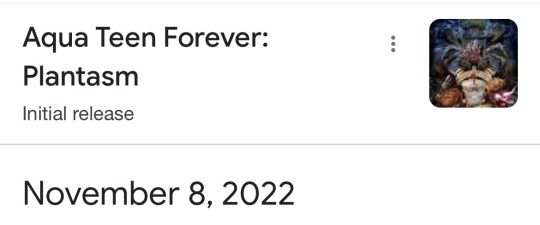
Which honestly that’s a vibe: praying to God and Satan that DeSantis gets kicked out of office while also rejoicing the return of the Aqua Teens (make the homies say ho and the girlies wanna scream).
#political on main#obviously I know not everyone is in favor of voting but honestly I’m willing to do anything to get that fucker out#and yeah should go without saying….fuck Ron DeSantis in general if you disagree feel free to leave#aqua teen hunger force#aqua teen forever: plantasm#us politics#adult swim#I plan on voting in seriousness but I’m still tempted to make Nathan Explosion for Governor shirts 😂
7 notes
·
View notes